ChatGPT for hotels represents one of the most powerful applications of today’s Artificial Intelligence (AI) technologies. Acting as an AI assistant, ChatGPT enhances guest experience and streamlines hotel operations by supporting a wide range of tasks, from guest messaging to personalized service, marketing strategies, and even recommending nearby attractions. Yet many hoteliers have yet to fully unlock their potential to deliver exceptional guest experiences and streamline operations.
In this article, we’ll explore how ChatGPT and other Generative AI technologies can transform hotel operations across the hotel industry.
What is ChatGPT? Everything a hotelier needs to know
There’s a lot of hype surrounding ChatGPT these days. Regardless of whether you have a tech background or not, we’ll help you navigate through the technology properly by compiling everything you need to know about Generative AI, GPT-4, and ChatGPT.
What is Generative AI?
Generative AI is a type of artificial intelligence (AI) technology that's used to create or generate something new from existing data. It can be used to generate new images, music, or other types of content. It works by using algorithms to identify patterns and trends in existing data and then using those patterns to create something new.
What is GPT-4?
GPT-4 (Generative Pre-trained Transformer 4) is an artificial intelligence (AI) system developed by OpenAI. It is a language-processing model that can generate human-like text based on the input it receives. GPT-4 is a powerful tool that can help with tasks such as summarizing text, completing sentences, and generating natural-sounding responses to questions. It can also be used in areas such as natural language processing, machine translation, and question answering.
What is ChatGPT?
ChatGPT is a type of technology that enables computer programs to have conversations with people, just like a human would. It uses natural language processing (NLP) to understand and answer questions and can give advice, tell stories, and generate creative ideas through conversation.
What is the difference chatbot and ChatGPT?
The difference between the two algorithms lies in the content of their data bank and how they utilize it. ChatGPT is trained on a vast public dataset to follow numerous commands, whereas a chatbot typically uses information specific to a business or industry to answer general business inquiries.
What are the benefits of ChatGPT for hotels?
Artificial Intelligence is reshaping the hotel industry faster than most hoteliers expect. A recent AI in hotel management report projects that 70% of travel agencies and 60% of hotels will increase their use of AI in the coming years.
Hotels can leverage ChatGPT as a strategic tool to enhance guest service and streamline operations, integrating it into existing systems for improved communication and efficiency.
While ChatGPT is widely known for generating content, its GPT-4 engine goes much further, producing human-like responses that support smarter room service, operational efficiency, and data-driven decisions. Below are some of the most impactful ways hotels can benefit from ChatGPT today.
1. Automate guest communication
Hotels often struggle with the time-intensive nature of guest messaging, booking queries, and upselling tasks. ChatGPT can handle these requests in real time by integrating with property management systems (PMS), allowing it to respond with availability, room suggestions, spa services, and upgrade offers. This helps guests easily book rooms or make restaurant reservations, all through personalized recommendations.
Instead of manually checking calendars and composing replies, hotel staff can focus on high-value guest interactions while ChatGPT handles routine exchanges, helping improve response time and guest satisfaction.
2. Analyze feedback at scale
Beyond messaging, ChatGPT is highly effective in processing large volumes of guest feedback. Using natural language understanding, it can process large volumes of guest feedback and analyze guest data to surface patterns in guest preferences, service issues, and demand for additional services like spa treatments. By identifying and responding to each guest's preferences, ChatGPT enables hotels to provide more personalized recommendations and tailored experiences, ultimately enhancing guest satisfaction.
However, specialized Generative AI tools like MARA AI review reply assistant can better extract key points from reviews and generate actionable insights. With consistent feedback analysis, hotel managers can prioritize room service upgrades, facility improvements, or staff training based directly on what guests care about most.
To generate these insights, however, hotels must actively collect feedback across multiple channels. Learn how to do that here.
3. Reduce booking abandonment
According to travel booking data, over 80% of hotel guests abandon bookings after starting a search. A common reason: unanswered questions at critical decision points.
By integrating ChatGPT into your website or messaging platforms, guests can instantly get answers about hotel amenities, policies, availability, or location, without having to wait for a hotel staff member. This reduces drop-offs and can boost direct bookings by improving customer engagement and providing instant answers, keeping potential guests engaged without redirecting them to online travel agencies.
4. Optimize pricing strategies
ChatGPT can assist hotel revenue managers in optimizing their pricing strategies by analyzing market trends, guest behavior, and competitor rates. By leveraging real-time data, ChatGPT can help hoteliers adjust room rates dynamically to reflect demand, seasonality, and local events. This ensures you're not only maximizing revenue per available room but also presenting competitive pricing that attracts potential guests.
Moreover, ChatGPT can support the booking process by providing instant rate explanations and comparisons when guests inquire, helping reduce friction and build trust. With AI-assisted pricing analysis, hotel owners can stay ahead of market shifts and ensure profitability without the need for manual monitoring.
5. Boost personalized experiences
Delivering a personalized guest journey is critical in today’s experience-driven hospitality market. ChatGPT enables hotels to offer tailored communication from check-in to post-stay, using guest profiles and preferences to craft relevant suggestions, such as room upgrades, spa treatments, or nearby activities.
By using AI to deliver relevant information based on individual needs, hotels can enhance guest experiences without overwhelming staff. Additionally, ChatGPT allows you to encourage guests to engage with hotel amenities or leave feedback, strengthening loyalty and satisfaction.
While automation is central to ChatGPT, its ability to preserve a sense of human connection, human interaction, and human touch through natural-sounding language makes it uniquely capable of maintaining warmth and empathy in digital conversations. When paired with proper data safeguards, it also respects guest privacy, ensuring a secure yet personalized experience.
What are the limitations of ChatGPT?
The power of ChatGPT is undeniable, but the technology also has its drawbacks that you should be aware of. Here are some of the most notable limitations of ChatGPT:
1. Outdated knowledge base
ChatGPT's overall algorithm is yet to be updated, as it's still limited to data from 2021. This means it can't answer current questions on new topics. In this example, ChatGPT has yet to record Argentina's win in the 2022 World Cup.

2. Factually incorrect answers
One of the major limitations to keep in mind when working with ChatGPT is the possibility of giving factually incorrect answers, although the answers always seem human and read well. Members of the active GPT-4 community have referred to this as "hallucinating" or "lying". In fact, StackOverflow has banned ChatGPT from their platform due to the potential harm that incorrect answers generated by ChatGPT may cause to their website and users.
3. Inconsistency with brand voice
While some Generative AI technologies can be synced to other IT systems (e.g., your business CRM), GPT-4 tools are typically not consistent with your brand voice. Since ChatGPT is more likely to generate content that may not fit your ideal writing style, it's imperative that your hoteliers still supervise the content generated.
These limitations of ChatGPT don't make it useless for businesses. It just means that no AI can replace people. They are only here to help hoteliers create better working processes and provide better guest experiences.
How can hotels use ChatGPT?
From front-desk automation to strategic planning, ChatGPT offers hotel operators powerful tools to improve efficiency, personalize guest experiences, and reduce manual work. Integrating ChatGPT into a hotel website can significantly enhance guest engagement and drive direct bookings by providing instant responses and tailored content. AI solutions can also be customized to fit a hotel's specific needs, improving management and elevating the overall guest experience. Here’s how hoteliers are leveraging Generative AI across different business functions:
1. Online reputation management
Generative AI is increasingly being used to manage and respond to guest reviews. However, while ChatGPT is capable of generating high-quality responses, its limited personalization capabilities make it challenging for hotels to maintain brand voice and deliver truly genuine guest interactions.
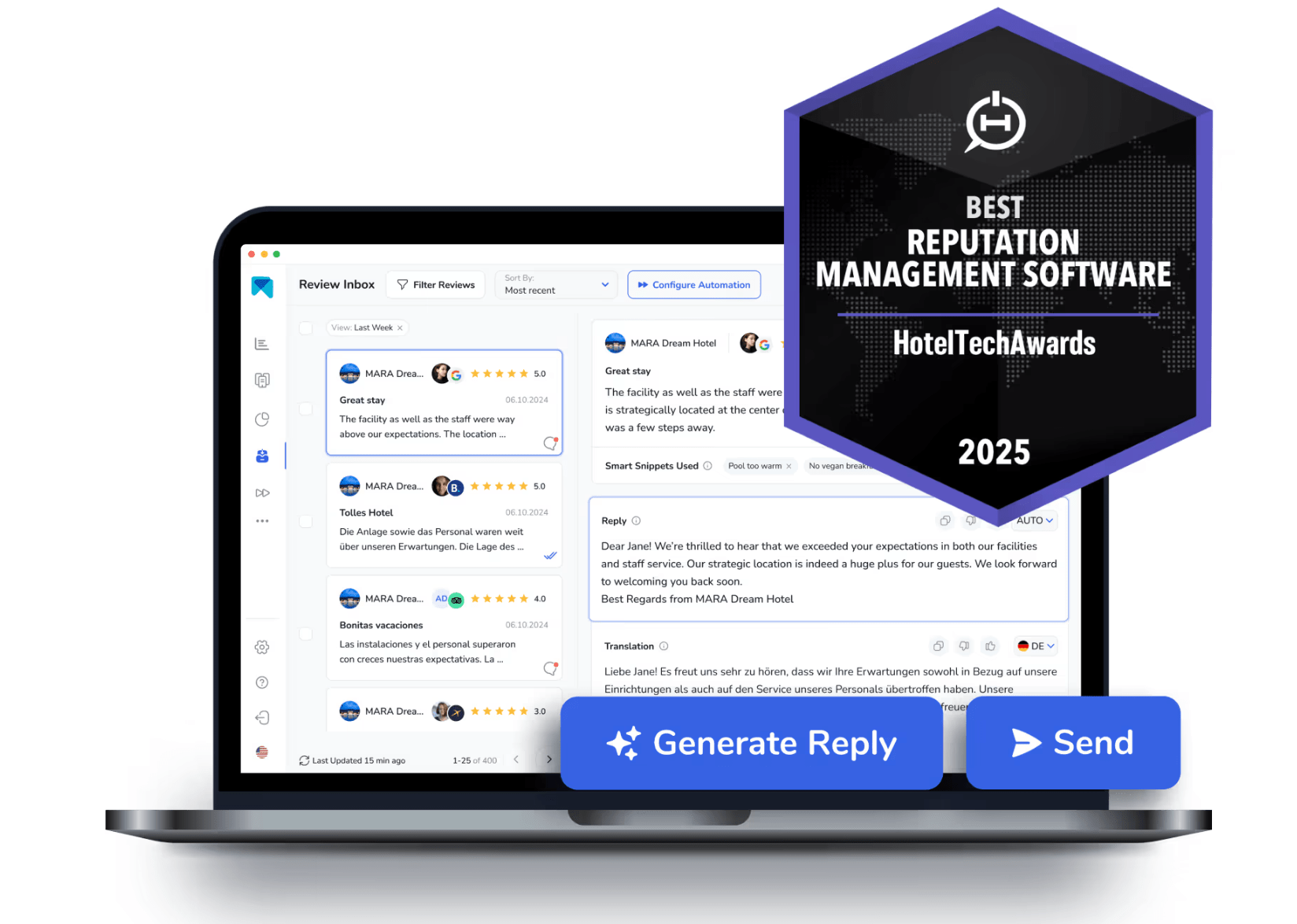
That’s why it's highly recommended to use specialized Generative AI tools like MARA, which are designed specifically for the hospitality industry. These tools can automatically reply to guest feedback while preserving tone, branding, and context, ensuring every response feels human and consistent with your hotel’s identity.
{{blog-cta="/features/product-updates"}}
2. Streamlining hotel operations
In today’s fast-paced hotel industry, operational efficiency is key to delivering outstanding guest experiences while keeping costs under control. ChatGPT is a game-changer for hotels looking to streamline daily operations. By automating routine tasks, such as responding to guest inquiries, processing room service orders, and handling booking modifications, ChatGPT allows hotel staff to focus on more complex tasks that require a personal touch and human interaction.
Thanks to advanced natural language processing, ChatGPT can quickly understand and respond to a wide range of guest requests, from questions about room amenities to booking spa services or recommending local attractions. This not only speeds up response times but also ensures guests receive accurate, personalized recommendations that encourage them to explore additional services during their stay.
3. Customer service
Hotels are now using ChatGPT to handle routine customer service inquiries, room availability, amenity details, and special requests through AI-powered chatbots embedded into websites, social media, and messaging platforms.
By automating these interactions, hotels free up staff for more complex tasks and deliver customer service faster, ensuring higher satisfaction and cost savings. ChatGPT can interpret natural language, understand guest intent, and deliver helpful, human-like responses, contributing to faster service and increased guest satisfaction. With advanced language models, chatbots are achieving 90% satisfaction rates, making them one of the most effective front-line support tools in the industry.
4. Data processing
Hotels manage a constant flow of internal guest data, from booking records to supply inventories to guest profiles. ChatGPT can help summarize and extract key information from large datasets using predictive analytics to optimize inventory levels, improve occupancy rates, and align offerings with guest preferences.
For example, when reviewing stock levels or supplier reports, ChatGPT can highlight trends or low inventory items and align suggestions with historical guest demand, allowing for more strategic procurement and resource planning.
5. Smarter decision-making
Predictive analytics powered by ChatGPT is transforming how hotels in the hospitality industry make strategic decisions. By analyzing guest data, including booking trends, room preferences, and demographic details, ChatGPT provides hotel owners with valuable insights that drive smarter business choices and revenue growth.
With predictive analytics, hotels can anticipate guest preferences and adjust room availability, pricing strategies, and marketing campaigns accordingly. For instance, ChatGPT can identify peak booking periods and recommend dynamic room rates to maximize occupancy and revenue. It can also help tailor promotions to specific guest segments, encouraging guests to book directly and boosting overall profitability.
6. Marketing content creation
Marketers use ChatGPT to streamline content production for hotel websites, social media platforms, and email campaigns, helping hotel owners drive direct bookings and maintain a consistent brand voice.
Additionally, with tools like MARA’s AI review response generator, hoteliers can respond to 100% of guest reviews at scale, boosting visibility and trust. Considering that 95% of consumers read reviews before booking, maintaining an active, responsive brand presence is critical.
7. Idea generation and strategy
ChatGPT also serves as a brainstorming partner for hoteliers exploring new strategies. Whether you need ideas for increasing TripAdvisor reviews, improving upsells, or running seasonal promotions that highlight local attractions, promote spa treatments, or partner with local businesses.
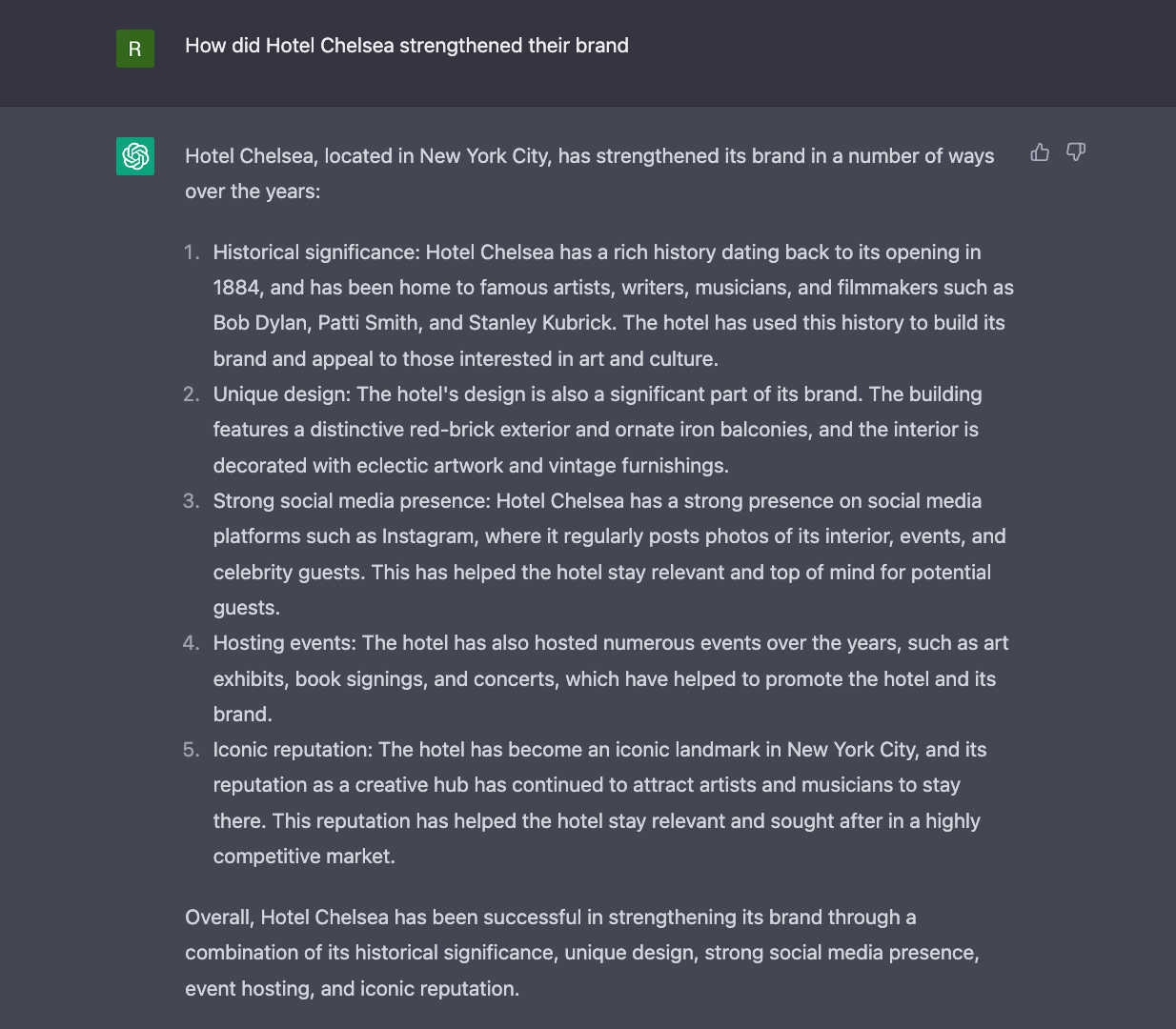
While these outputs still require human review and contextualization, they give hotel managers a competitive edge in campaign planning and guest engagement.
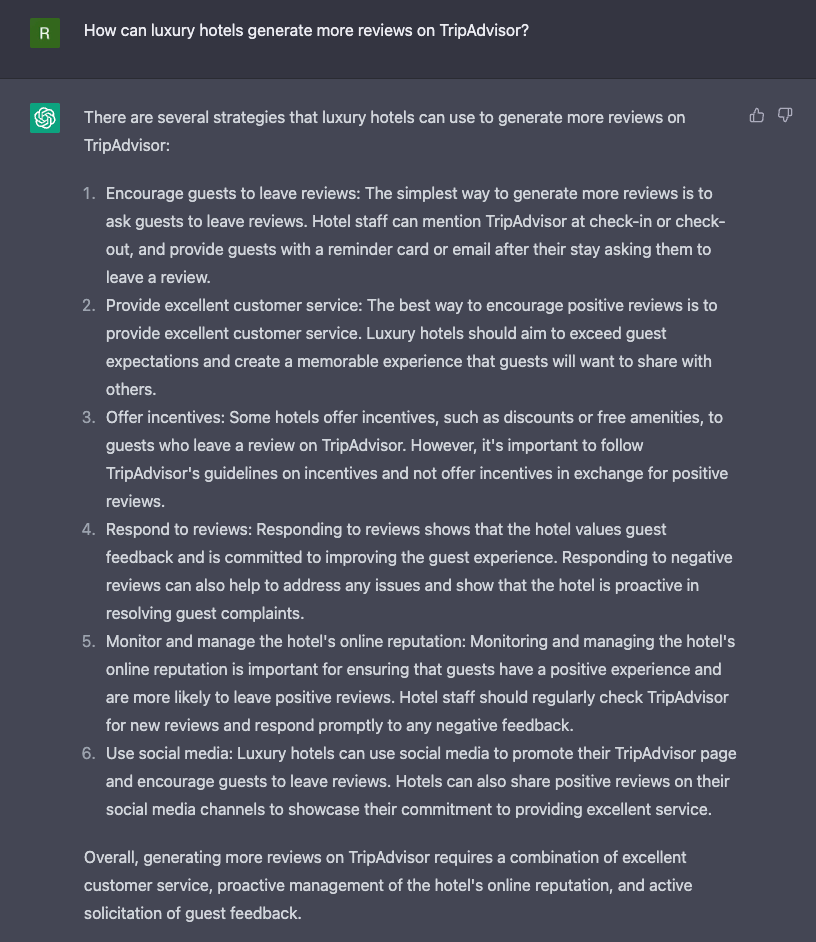
Case studies and examples: Real-world success stories
Many hotels are already reaping the rewards of integrating ChatGPT into their operations. For example, a luxury resort in Hawaii implemented ChatGPT to personalize guest interactions, offering tailored suggestions for local attractions, spa services, and restaurant reservations. This approach led to a notable increase in guest satisfaction and a surge in direct bookings, as guests felt more engaged and valued throughout their stay.
Similarly, a boutique hotel in New York City leveraged ChatGPT to streamline its booking process and reduce operational costs. By automating routine guest communications and providing personalized recommendations, the hotel not only improved efficiency but also enhanced guest experiences, resulting in higher revenue and stronger guest loyalty.
These real-world examples highlight how ChatGPT can help hotels of all sizes, from boutique hotels to luxury resorts, enhance guest experiences, optimize operations, and drive revenue growth in the competitive hospitality industry.
Best practices for implementing ChatGPT in hotels
To unlock the full benefits of ChatGPT, hotel owners should follow a set of best practices for successful implementation. Start by clearly defining your goals: whether it’s improving guest satisfaction, streamlining operations, or increasing revenue. Next, invest in comprehensive staff training to ensure your team understands how to use ChatGPT effectively and integrate it with existing hotel systems.
Guest privacy should always be a top priority. Make sure your use of ChatGPT complies with all relevant data protection regulations and that sensitive guest information is handled securely. Regularly monitor and evaluate ChatGPT’s performance, gathering feedback from both guests and staff to identify areas for improvement.
By continuously refining your approach and staying up to date with the latest AI advancements, your hotel can use ChatGPT to deliver exceptional guest experiences, boost revenue, and maintain a leading position in the hospitality industry.
What are the top alternative AI tools for ChatGPT for hotels?
- MARA AI Review Reply Assistant - Crafts fully optimized responses to online reviews.
- DialogShift - Automates the response to frequent guest inquiries.
- VOICEplug - Enables hotel restaurants and cafés to offer an interactive and conversational ordering experience.
1. MARA AI Review Response Generator
Responding to online reviews can be a daunting task, but it doesn't have to be with our AI Review Assistant of MARA. This intuitive tool is designed to ease your Online Reputation Management process, making it more efficient, personalized, and time-saving. It offers the best and most personalized AI for responding to and analyzing your guest reviews.
Centralized Review Inbox
One of the key features of this tool is the Review Inbox. Your review inbox makes responding to reviews as simple as hitting "Generate reply" and clicking "Send". The Review Inbox connects to multiple review sources, including Google, Booking.com, and Tripadvisor, giving you a panoramic view of all your reviews. And you can even configure review response automation: Why not allow MARA to automatically respond to simple reviews, like 5-star Google reviews with no text, ensuring you never miss a review? Daily notifications about new reviews keep you updated and in control.

Advanced Review Analytics
To help you understand and analyze the multitude of reviews, the Review Assistant also incorporates Review Analytics. This provides actionable, easy-to-understand insights that are tailored exclusively to your business. With MARA, you can quickly get the gist of all your reviews without needing to read each one. The analysis is so detailed that you can find out about specific issues like "water in the pool is too cold" or "lack of vegan breakfast option”. These insights help optimize guest experience without requiring you to be a data expert.

The most personal response AI
MARA's AI isn't just about efficiency; it's about personalization too. The Brand Voice feature allows the AI to adapt to your tone, making sure your responses sound authentically you. Plus, with Smart Snippets, you can "teach" the AI how to respond to recurring praises or complaints. Your AI then incorporates this information into its responses, but always with different words, providing more personalized, relevant replies.
This review response assistant has quickly become a game-changer for over 2000 customers. Its promising capacity to elevate your overall rating, amplify response rates, glean insights from customer feedback, and economize both time and money is the reason behind its growing popularity.
Managing online reviews need not be an overwhelming task. With the appropriate software, not only can you streamline the process, but you can also personalize your responses and derive valuable insights from the reviews. So, why hesitate to give our AI Review Assistant, MARA, a try? It's completely free for testing, doesn't require a credit card, and can be fully operational in less than five minutes.
2. DialogShift
DialogShift is more than just a chatbot tool. It offers an easy and efficient guest communication process from Google search to checkout, with flexible integration options to various social media websites and other guest apps. Through DialogShift, managers can maximize self-service automation to unload mundane and repetitive tasks from their hoteliers.
DialogShift uses Generative AI to create a very human-sounding chatbot that handles guest requests. This is especially important for the hospitality industry as guests look forward to personal interactions that make them feel understood and validated before booking their accommodation.
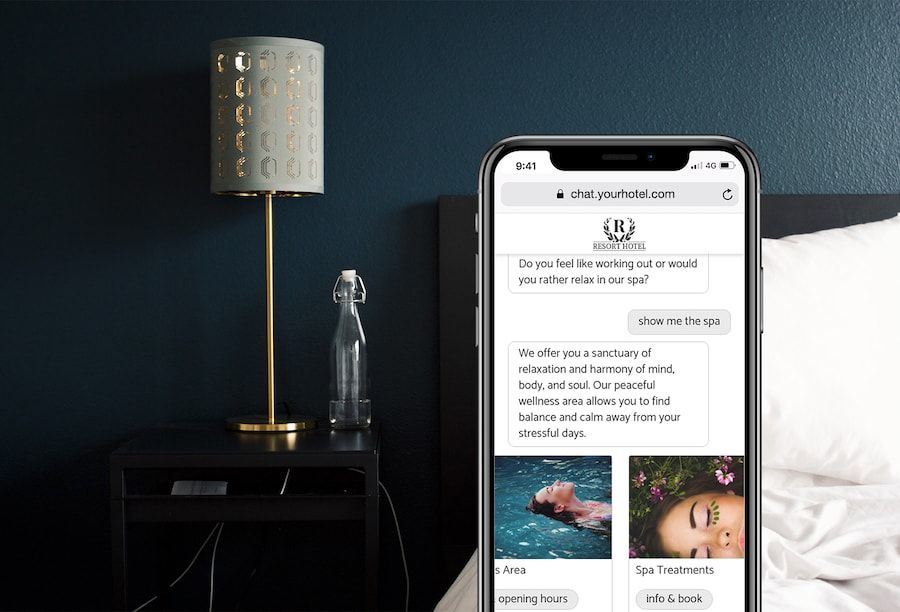
The Head of Sales & Marketing at Welcome Hotels Schweiz says DialogShift has enabled them to respond promptly to inquiries. This gives them a significantly high conversion rate, as guests can directly book their stay after their inquiry.
3. VOICEPlug
While restaurants mainly use VOICEPlug, the voice AI solution can also be integrated into the phone system and online ordering CRM of hotel-based cafes. The tool enables the staff to accept customer orders using natural voice conversations and authentic language commands.
Like MARA AI and DialogShift, VoicePlug uses Generative AI to deliver a natural chat experience. This way, hotel-based restaurants can upsell their products and create dynamic menus without losing the human touch that’s vital for the hotel industry.
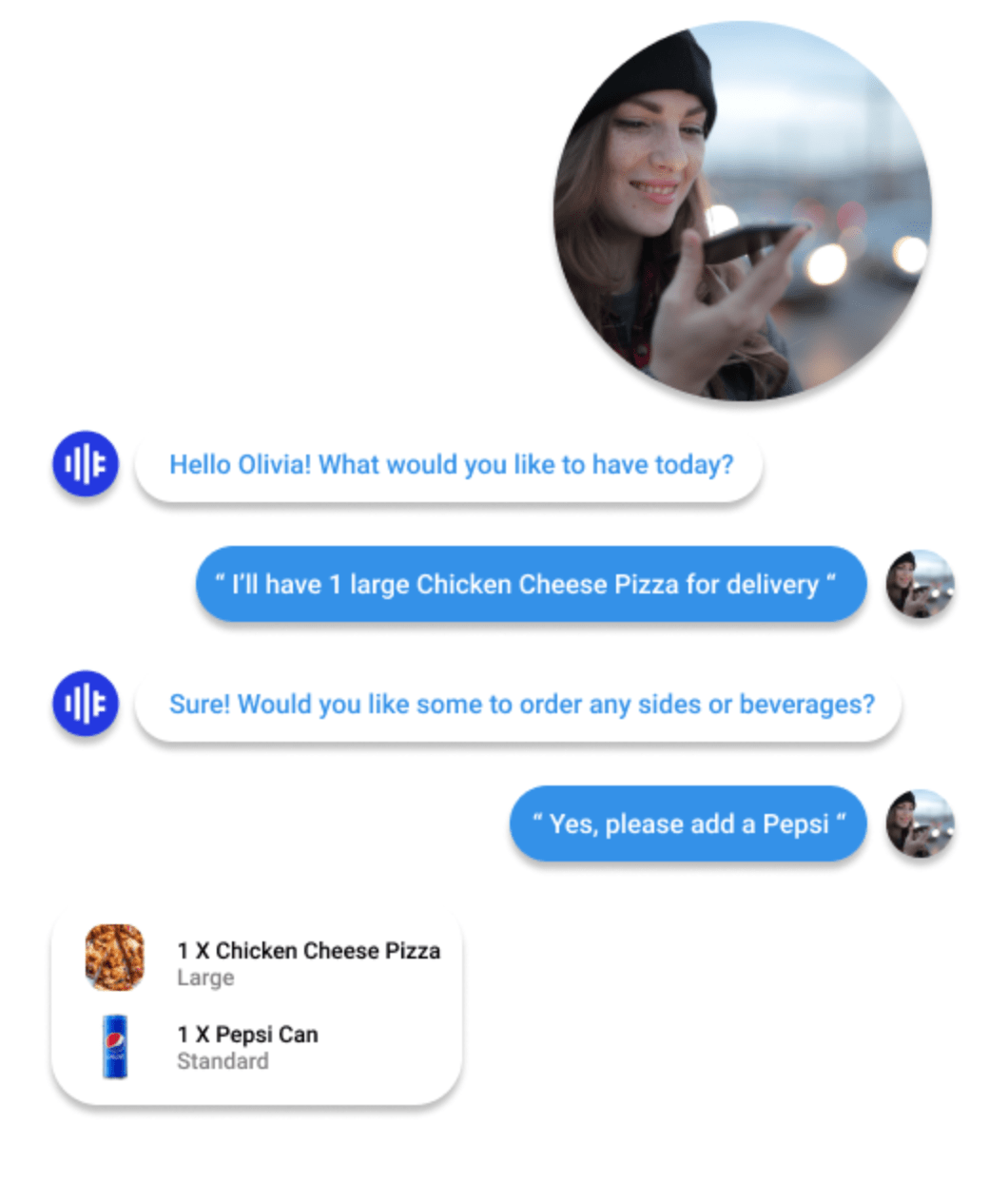
As of this writing, VOICEplug declares a 90% reduction in customer abandonment rate, a 75% reduction in per-order costs, and a 35% increase in average check size per order among their partners.
How to deploy ChatGPT for hotels?
Deploying ChatGPT in a hotel setting requires a strategic approach to ensure it integrates seamlessly into your operations. Here’s a step-by-step guide:
1. Identify use cases
Start by defining where ChatGPT can add the most value; common areas include guest messaging, review management, front desk inquiries, content creation, and internal knowledge sharing.
2. Choose the right platform
Select a ChatGPT-powered tool or API that aligns with your goals. For hotel-specific needs like branded review responses or PMS integration, consider specialized AI solutions like MARA.
3. Ensure data privacy and compliance
Before deployment, review your data handling practices. Avoid inputting personally identifiable information (PII) into AI prompts and ensure GDPR or local data regulation compliance.
4. Integrate with existing systems
Connect ChatGPT with your PMS, CRM, or messaging platforms (e.g., WhatsApp, website chat, or social media) to enable automated, real-time interactions.
5. Customize and train prompts
Tailor prompt templates to reflect your brand tone, FAQs, and service standards. This step ensures consistency and relevance in guest communications.
6. Pilot and monitor performance
Launch a limited pilot in one or two departments. Track performance metrics as well as improvements in direct bookings, occupancy rates, and reductions in operational costs.
7. Refine and scale
Use feedback to improve prompts, workflows, and integrations. Once optimized, scale the deployment across other departments or properties.
By following these steps, hoteliers can harness ChatGPT to improve service, save time, and deliver a more seamless guest experience.
Can ChatGPT find hotels?
ChatGPT can help users find boutique hotels to 5-star hotel brands by generating recommendations based on user preferences, such as location, budget, amenities, and travel dates. However, it doesn’t access real-time availability or booking data unless integrated with third-party APIs like those from OTAs or hotel booking engines. When connected to live data sources, ChatGPT can act as a smart assistant, filtering options, summarizing guest reviews, and offering personalized recommendations for luxury resorts, family stays, or hotels near popular local attractions.
How to add your hotel to ChatGPT’s information bank?
ChatGPT pulls its responses from publicly available online data, so the key to being discoverable is improving your hotel’s digital footprint. Here’s a step-by-step guide:
1. Create and optimize your website
Ensure your hotel’s website includes up-to-date content on location, amenities, room types, pricing, and contact details. Use clear, structured content with relevant keywords. Click here for a full guide on listing optimization.
2. List on major OTAs and directories
Add your hotel to platforms like Google Hotels, Booking.com, Expedia, and TripAdvisor. These platforms are frequently referenced in ChatGPT’s training data and APIs.
3. Maintain an active Google Business profile
Update your business hours, address, phone number, and photos. This helps both ChatGPT and other AI assistants provide accurate local information.
4. Publish consistent content
Share blog posts, reviews, and updates across your website and social media. The more high-quality content available, the more likely ChatGPT is to reference it in responses.
5. Encourage reviews and engagement
Guest-generated content on review platforms increases visibility and helps AI models learn about your property’s strengths and reputation.
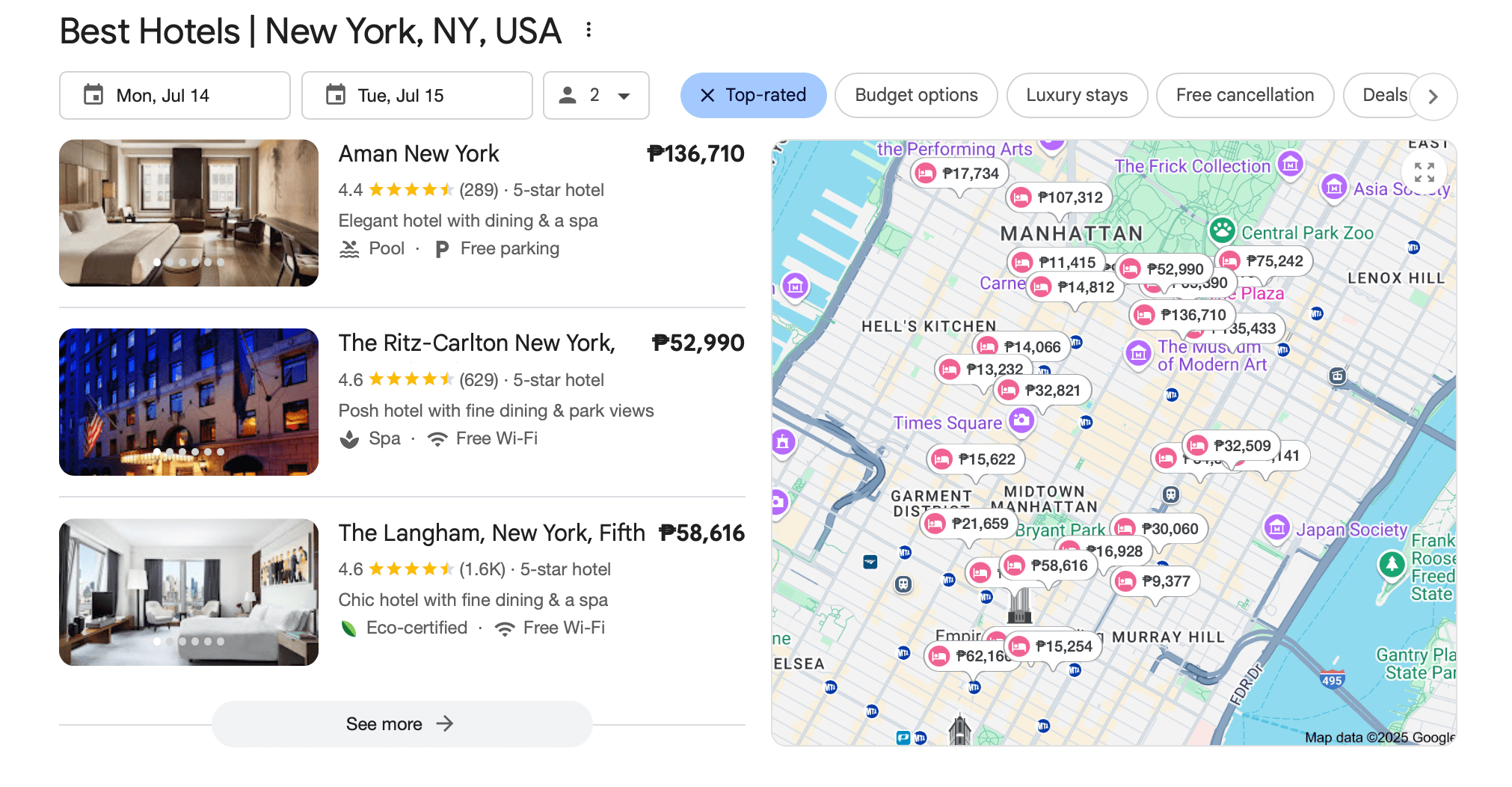
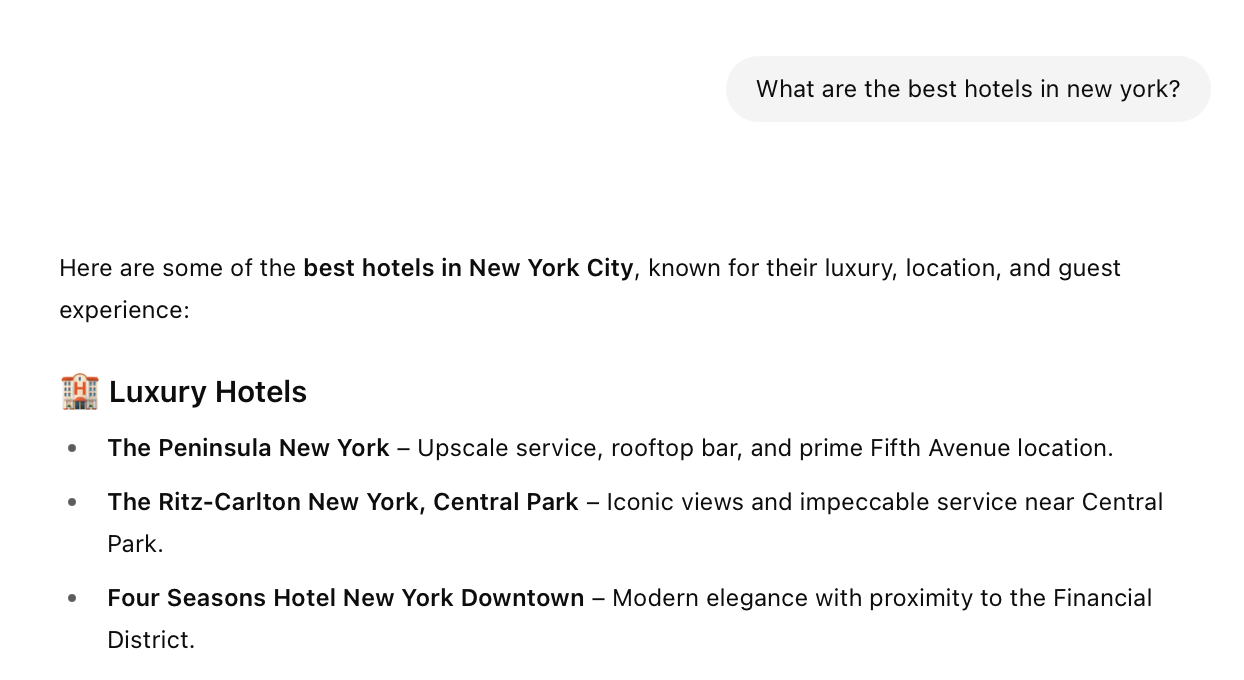
Although you can’t submit data directly to ChatGPT, maintaining a strong online presence ensures your hotel is accurately represented in AI-generated answers.
{{blog-cta-book-demo="/features/product-updates"}}
Generative AI, GPT-4, and ChatGPT for hotels are changing the hospitality industry.
Generative AI technologies like ChatGPT are shaping the future of the hospitality industry. As hotels embrace these innovations, they gain the ability to deliver highly personalized experiences, streamline operations, and drive revenue growth. From virtual concierges to predictive analytics and targeted marketing, the possibilities for enhancing guest experiences are expanding rapidly.
However, hotel owners need to remember that technology should enhance, not replace, the human connection and human touch that define great hospitality. By thoughtfully integrating ChatGPT and prioritizing authentic guest interactions, hotels can stay ahead of the competition and create memorable stays that foster loyalty and repeat business.
As generative AI continues to evolve, hotels that adopt these tools and follow best practices will be well-positioned to thrive in a dynamic, guest-centric industry, delivering the kind of service that keeps travelers coming back time and again.
This article is part of our hero content, “The Future of AI in Hospitality: Trends, Tools, and Use Cases".
Frequently Asked Questions:
ChatGPT helps businesses reduce manual administrative tasks, enhance customer experience, boost consumer engagement, and even create operational plans to boost revenue. The said technology is also extensively used in marketing for creating online content for websites, social media accounts, and online listings.
Chatbots are now widely used in the hospitality industry. They allow hotels to answer inquiries in the most efficient way possible, leading to higher conversion rates. Aside from this, it also helps hoteliers create a more personalized experience for each guest, which boosts customer satisfaction.
Yes, ChatGPT can be used commercially, even by boutique hotels. OpenAI allows businesses to integrate it into workflows like guest messaging, marketing, data analysis, and staff training. However, it's important to follow data privacy regulations and avoid entering sensitive guest information. For more personalized and brand-consistent outputs, especially in guest-facing use cases, many hoteliers opt for specialized platforms built on ChatGPT or GPT-4.
ChatGPT can integrate with Property Management Systems to automate tasks like checking room availability, processing bookings, updating guest profiles, and managing service requests. When connected via API, it enhances efficiency by enabling real-time, AI-powered interactions across messaging platforms, reducing staff workload, and improving guest response times.


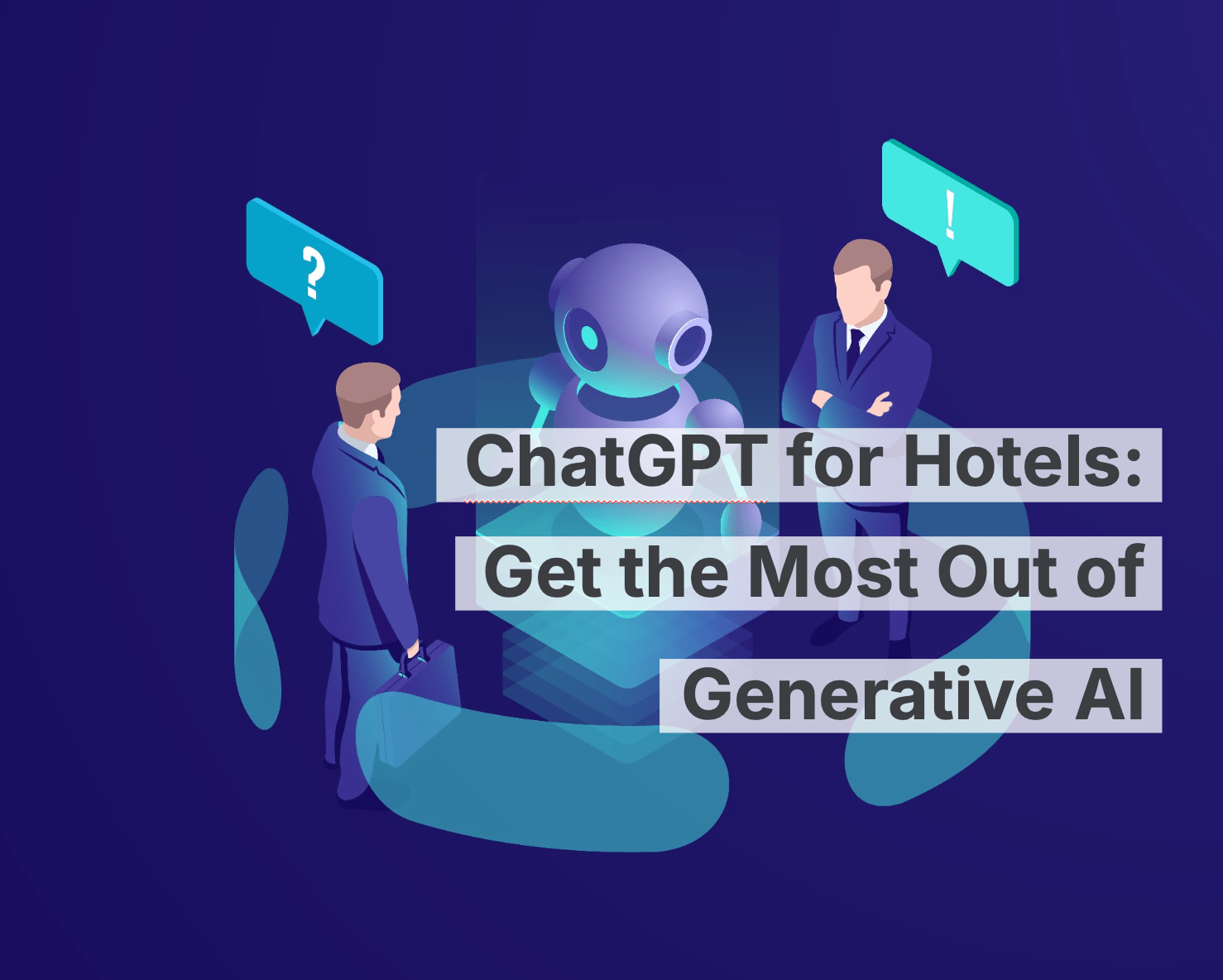
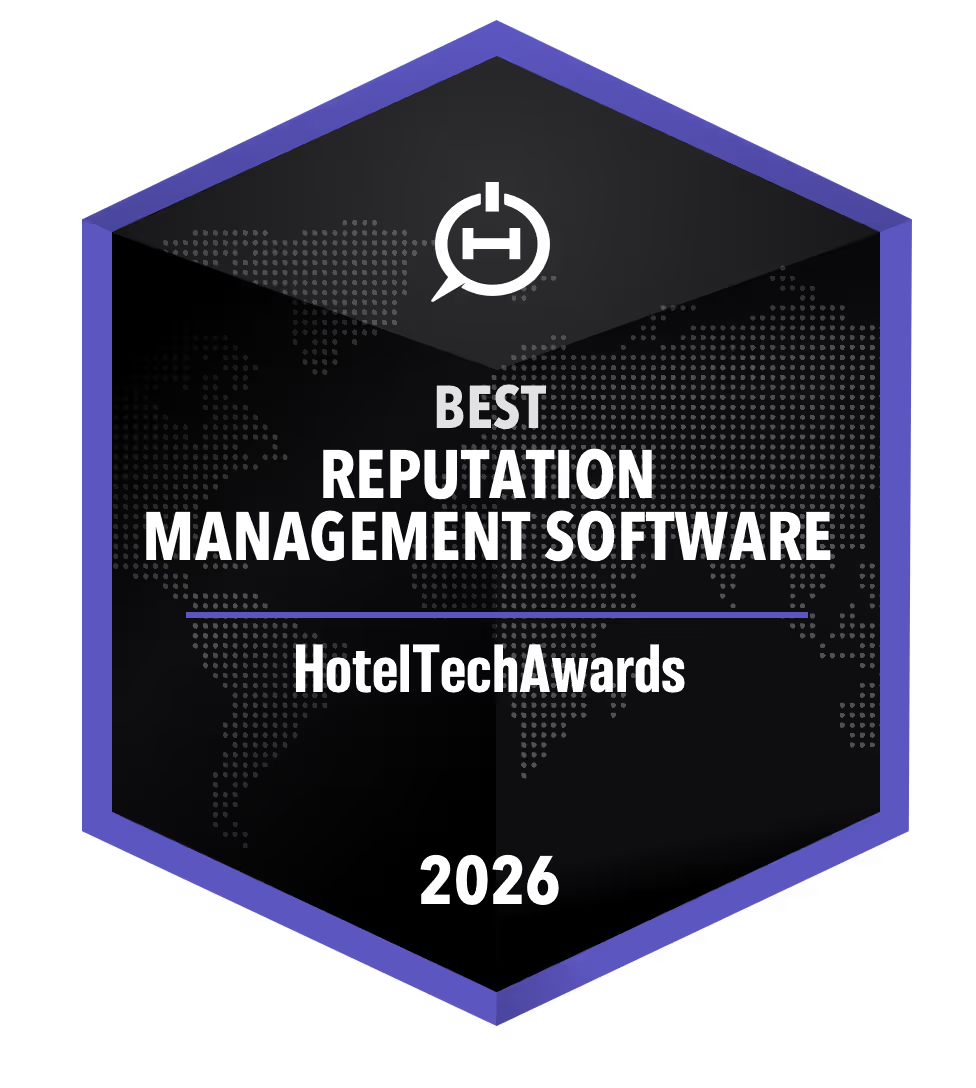


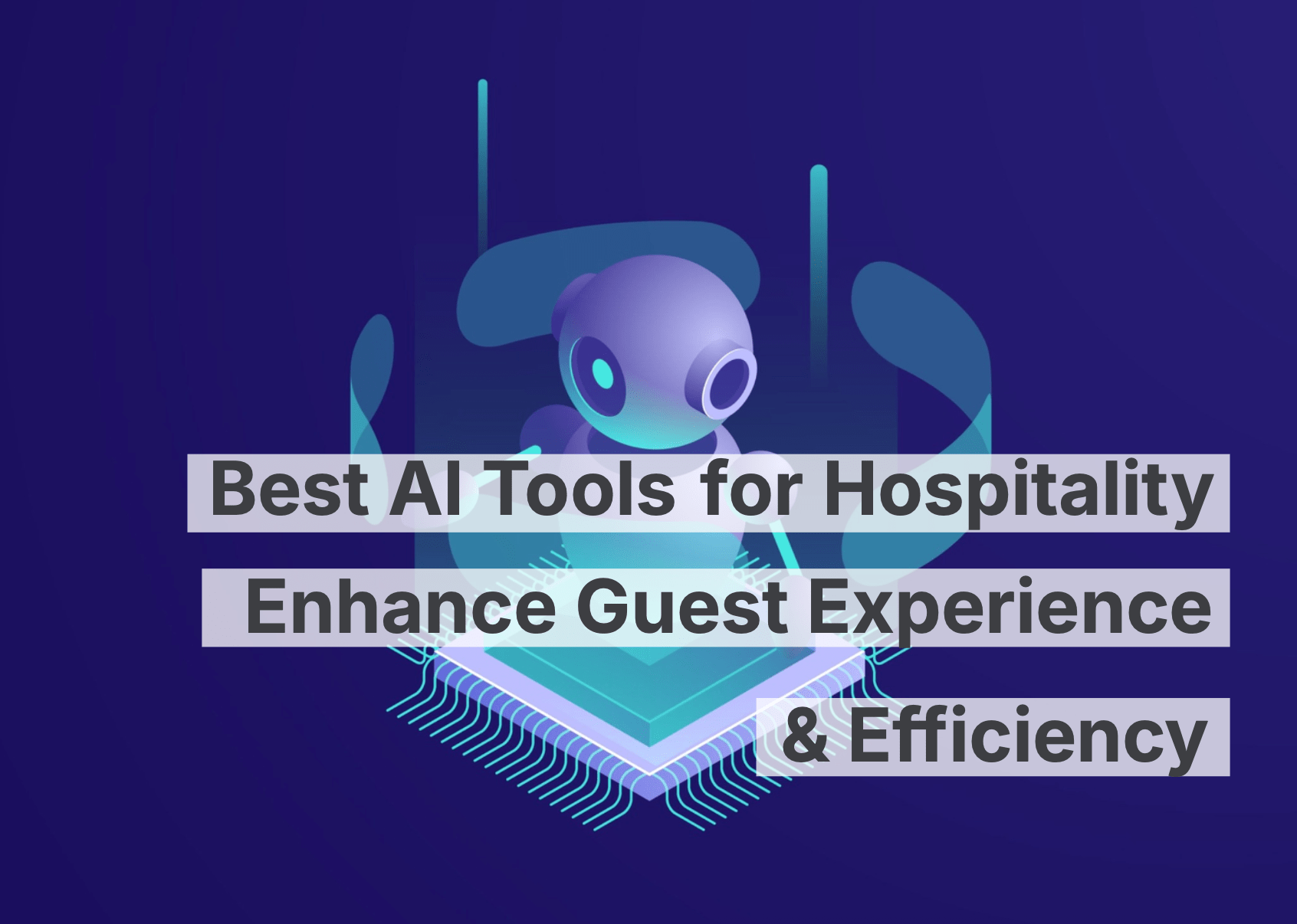


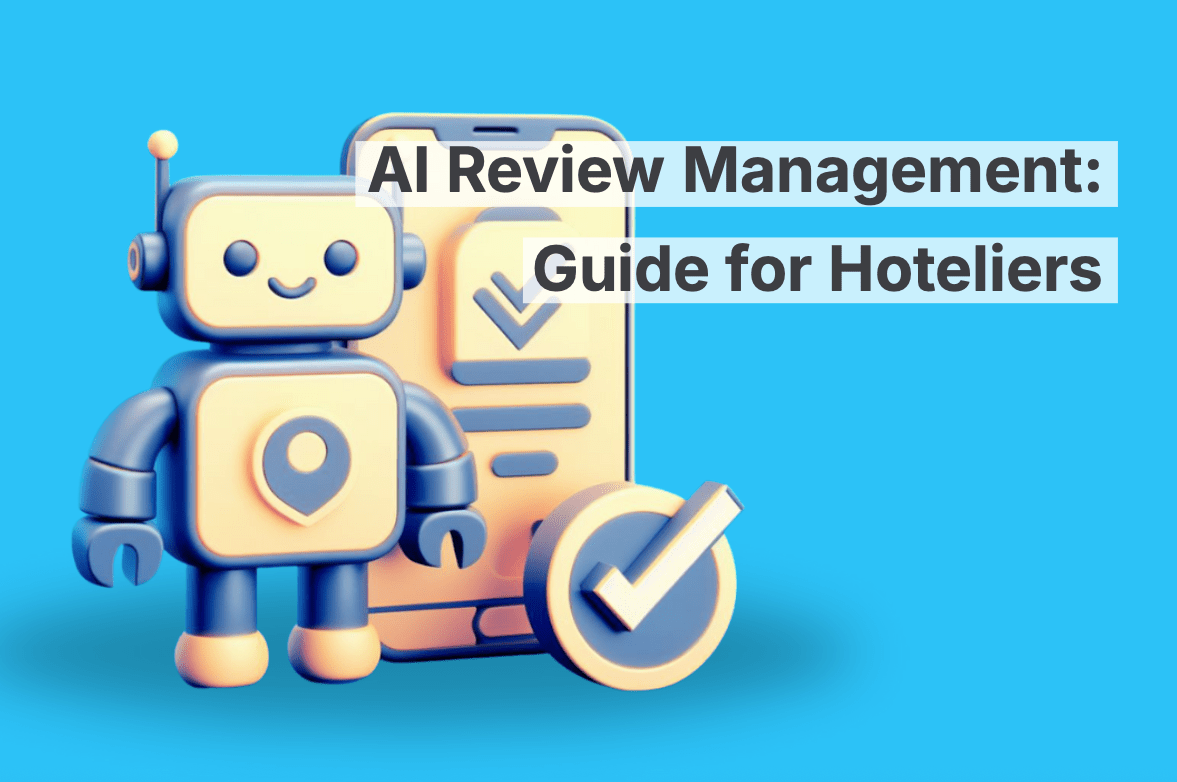








-min.avif)
